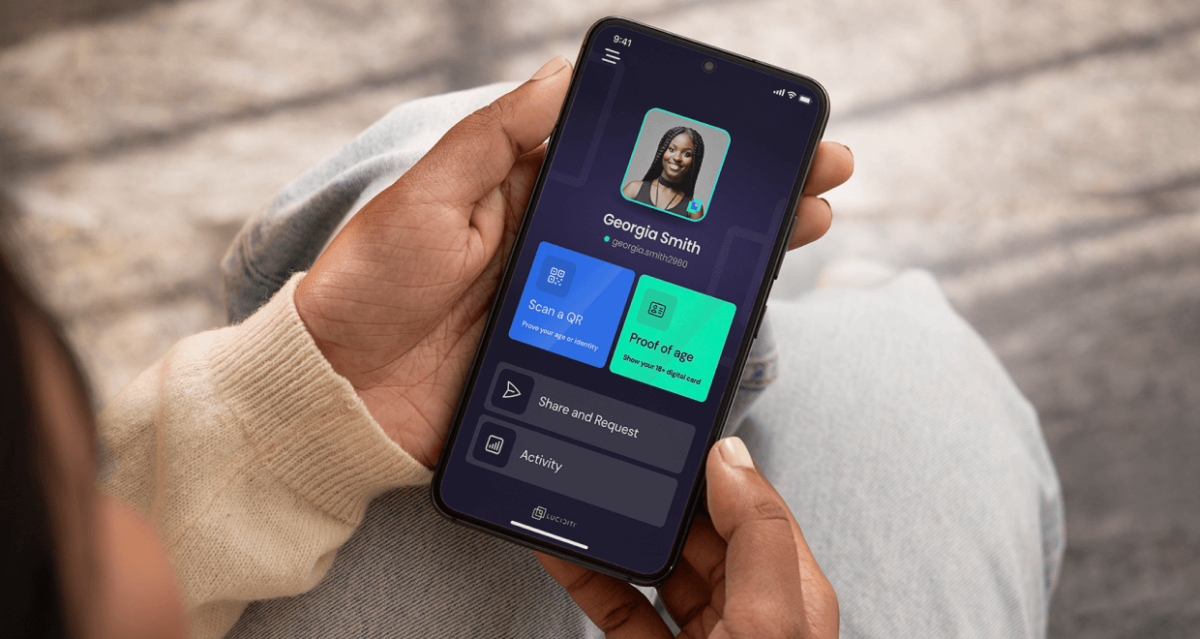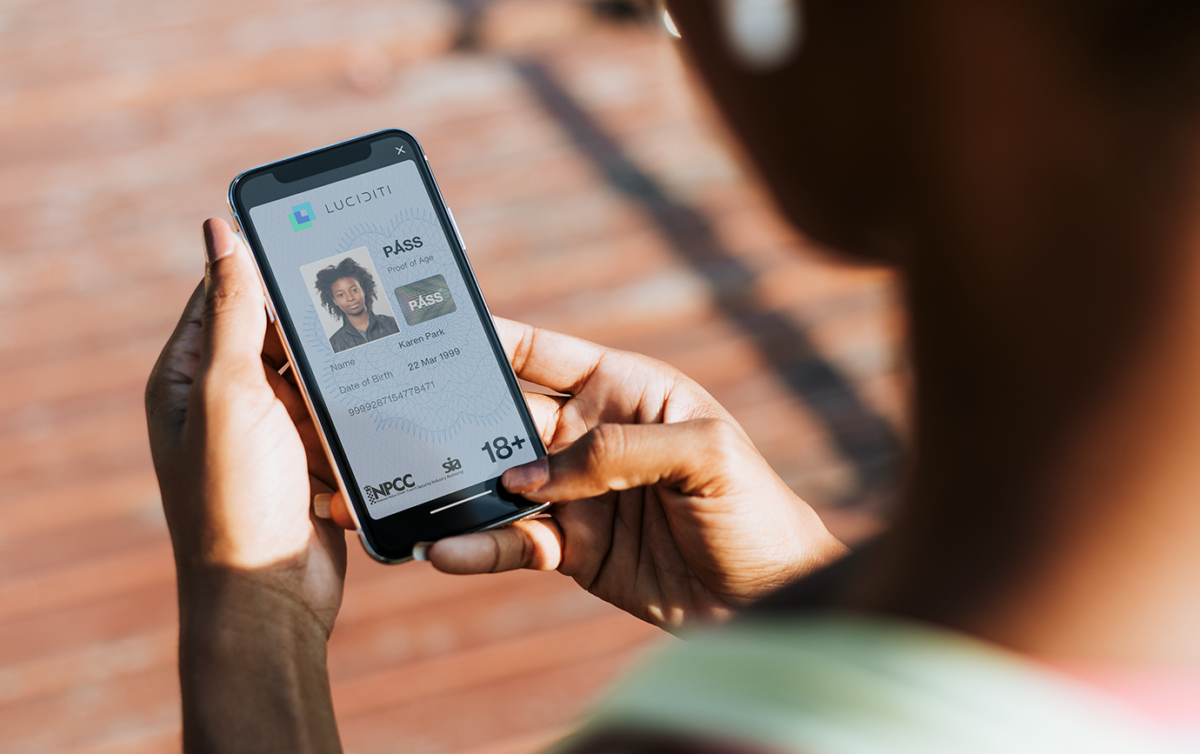Digital ID to be accepted as proof of age in alcohol sales. Apps like Luciditi offer safer alternative to physical ID documents.
It will soon be possible to buy alcohol using a digital identity to confirm your age, the government has announced. The decision means that consumers will be able to use trusted ID apps like Luciditi rather than take their passport or driving licence to pubs, clubs, and supermarkets.
The move comes in response to a consultation that ran from January to March, 2024. This asked stakeholders whether young people should be allowed to use a digital identity service to prove they’re old enough to buy alcohol.
A clear majority of respondents (72%) said that existing legislation should be updated to allow consumers to use digital ID in retail settings such as supermarkets, off-licences, restaurants, pubs, and clubs. Digital identity apps like Luciditi can facilitate a quick and easy process at the point of sale, similar to contactless payments or scanning a QR code.
Luciditi relies on evidence scanned from personal identity documents uploaded by the user. These are stored in a digital wallet and are securely protected by high-grade security. Typically they’re not shown to a third party, the app simply assures a retailer that the user has been verified as 18 or over.
Digital identity trust framework
Age assurance depends on trust. A digital identity service will only be accepted in the sale of alcohol if it has been certified against government standards.
At the moment, trusted digital ID providers, including Luciditi, are voluntarily certified against the UK’s digital identity trust framework, a set of rules defining a good digital ID service.
The framework will soon be put on a statutory footing by the Data (Use and Access) Bill, (DUA), currently passing through Parliament. After the DUA Bill receives royal assent, expected sometime later this year, the framework will underpin a new Digital Verification Service. This will oversee a public register of certified digital ID providers.
The government has also said that DUA will be amended once it comes into law, expanding the scope of digital identities so they can be used as proof of age in alcohol sales.
Verification, rather than estimation
The consultation process, initiated by the previous government, focused on whether the Licensing Act 2003 should be updated to allow the use of digital ID. A total of 251 complete responses were received from licensing authorities, the alcohol and hospitality industries, policing, trading standards, technology companies, delivery partners, civil society organisations, and members of the public.
Most respondents thought the proposed changes would have a positive impact, though some raised concerns about data protection and the potential for digital identities to be hacked or faked.
Similar concerns raised in the past prompted the decision to create the Digital Verification Service, putting the trust framework on a more formal footing. Only verification will be acceptable in the sale of alcohol. Other technologies, such as age estimation, currently fall outside the framework and won’t be accepted.
Next steps
The government is currently looking at the minimum level of service required from a digital ID provider. At the moment, anyone checking an ID document when selling alcohol needs to confirm three things:
1. Does it show that the person is over 18?
2. Does it belong to the person presenting it?
3. Is it a genuine document?
In practice, this means that a retailer must look at the date of birth to work out the person’s age, compare a photo to the person standing in front of them, and look for security features like holograms or ultraviolet marks to make sure the documents are real.
Digital identity tech needs to do the same, quickly, reliably, and securely. The Department for Science, Innovation and Technology (DSIT) is working with the Home Office on three main requirements.
Firstly, to be certified and included on the new register, a provider must be able to securely use ID data to verify that someone is 18 or over. Secondly, the tech must confirm that the digital identity belongs to the person presenting it. On this, the Office for Digital Identities and Attributes (part of DSIT) said that:
“Digitally, this can be done using biometric authentication. For example, a user can scan their face with their smartphone to access their digital identity. The scan of their face is bound to the photo on the original document. This allows them to securely prove that the identity belongs to them. By logging into the app in this way, the person can prove that the identity belongs to them.”
Thirdly, the identity must be verified as genuine. This means that a digital ID has to be scanned by a device rather than simply assessed by a person, similar to an e-ticket being scanned at a venue. Age assurance may involve scanning a QR code or using NFC technology similar to contactless payments.
Remote sales of alcohol
The Licensing Act was passed in 2003, since then however the way that people buy alcohol has changed. The consultation also looked at using digital IDs in remote sales, when alcohol is bought in a setting that’s not face-to-face.
Drink can be bought online, or in other ways that don’t involve face-to-face contact, for example at supermarket self-checkout tills or in a restaurant that accepts orders via an app. Age checks are currently required at the point of sale, but not at the point of delivery.
The consultation asked whether age checks at the point of delivery should be introduced. This is complicated by the fact that it’s an offence to sell alcohol to a person who’s drunk, and so the consultation also asked whether there should be mandatory checks at the point of delivery to determine whether someone is already intoxicated.
These questions raise practical difficulties, for example in the ability to leave goods in a safe place for the customer to collect. While a majority of respondents (58%) agreed that the Licensing Act should be updated to make it an offence to deliver to someone who’s drunk, there were concerns about how this would work in practice.
On these complicated issues, the government said “this is an area that requires further consideration. We will undertake further work in this area in due course.”
Safer checks for young people
A key priority is to safeguard the aims of the Licensing Act 2003 including the need to protect children from harm. This led to a requirement for age checks, which in practice means that young people have to carry valuable personal documents into pubs, clubs, and restaurants.
When they hand over their document to be checked by whoever’s at the door, people are potentially exposing their name, sex, current address and date of birth. Digital ID promises to maintain the integrity of the Licensing Act while allowing faster, safer and more secure verification.
James Hawkins, from the British Beer and Pub Association, said “this welcome change brings the Licensing Act in line with current technology and will make a visit to the pub easier for both customers and staff.”
Digital ID services generated £2.05 billion in 2023/2024, and employed over 10,000 people – half of them outside London. ID tech, from trusted providers, helps to boost the economy, protect young people, and perhaps even cut queues at the bar.



